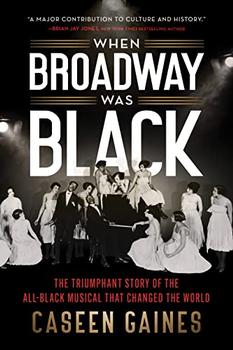Summary | Excerpt | Reading Guide | Reviews | Beyond the Book | Readalikes | Genres & Themes | Author Bio

The Triumphant Story of the All-Black Musical that Changed the World (aka Footnotes)
by Caseen Gaines
Even with the homely accommodations, Miller and Lyles were determined to set themselves up for success. They'd noticed that the African American acts that did the best had singing and dancing, and while the men had a little rhythm, vocalizing was not in their wheelhouse. For added insurance, they hired three women as chorus girls and branded the act the "Ebony Five." Booking agent Frank O'Doyle quickly found them work playing fifteen shows a day at a small house on State Street, near the Loop in Chicago. The comedians barely had money left over for themselves after paying the chorus girls their salary, which became even more irritating when the women began showing up late to performances. As their first week approached its end, Miller and Lyles called a group meeting to address their lack of professionalism. The women laughed in their faces. " Can you imagine the nerve of them? They can't sing or dance, and without us, they wouldn't have an act! We are carrying them."
The comedians were furious. They had decided to grab a bite so they could blow off some steam and weigh their options when they ran into Frank Frabito, manager of the ramshackle theater. He complimented their comedic ability, and if they'd agree to play another week, he was willing to increase their salary. Miller and Lyles confided that they were planning on taking some time away from the stage so they could replace their chorus, but they'd misunderstood. The manager liked the comedians; he thought the chorus girls were superfluous. Miller and Lyles ran back to the theater and laid it on thick, telling the women they didn't want to be a burden anymore and thanking them for carrying the show this past week. The chorus girls grabbed their things and left, and on their way out of the venue, they saw the sign being changed out front—MILLER AND LYLES. HELD OVER FOR ANOTHER WEEK. They turned on their heels, bursting with excitement over the news. "Say," one of the women said. "We're being held over for another week!"
"Not you," Lyles said, dropping the facade. "Miller and Lyles are being held over." But the women thought they'd have the last laugh. The next day, they returned to the theater, this time as spectators, certain they'd see the comedians fall on their faces. Miller and Lyles stepped onto the makeshift stage in burnt cork makeup, just as Hogan and Bert Williams had done before them. For the comedians, darkening their skin was a necessary means to an end. "Blackface was the bait to draw them in," Miller explained. "Once on the inside, they would enjoy our fine art." The two performed what they called a "syncopated argument," a rhythmic exchange of one-upmanship and unfinished sentence bits, where they seemingly used telepathy to finish each other's statements. They ended with their old boxing routine from their days at Fisk, which once again brought the house down. Their former colleagues left without saying goodbye.
While the practice of European performers darkening their skin to play people of color onstage traces back to the 1400s, by the 1830s, it became commonplace for white minstrels to imitate Blacks by darkening their skin with burnt cork. They would cover their faces until they were the color of tar, leaving just enough space to paint on a wide mouth with bright red or white exaggerated lips. The look would become complete with a natty wig, tattered clothing, white gloves on occasion, and a heavy Southern drawl with English so broken, it was hardly intelligible. These imitations were purely for the enjoyment of white audiences, and through humor, music, and dance—theatricality— they often played up to the idea that Blacks were uneducated, inarticulate, shiftless, lazy, superstitious, and longed for life on the master's plantation. Its use became popularized in 1828, when white song-and- dance man Thomas D. Rice wrote and performed the song "Jump Jim Crow," which inadvertently coined the term that would later refer to a set of racially discriminatory laws.
Excerpted from When Broadway Was Black by Caseen Gaines. Copyright © 2021 by Caseen Gaines. Excerpted by permission of Sourcebooks. All rights reserved. No part of this excerpt may be reproduced or reprinted without permission in writing from the publisher.
When first published in hardcover in 2021, this book was titled Footnotes: The Black Artists Who Rewrote the Rules of the Great White Way. In paperback, it was renamed, When Broadway Was Black: The Triumphant Story of the All-Black Musical that Changed the World. The reviews below were written ahead of the hardcover edition being published, and thus refer to Footnotes.
Idealism increases in direct proportion to one's distance from the problem.
Click Here to find out who said this, as well as discovering other famous literary quotes!
Your guide toexceptional books
BookBrowse seeks out and recommends the best in contemporary fiction and nonfiction—books that not only engage and entertain but also deepen our understanding of ourselves and the world around us.